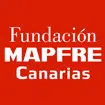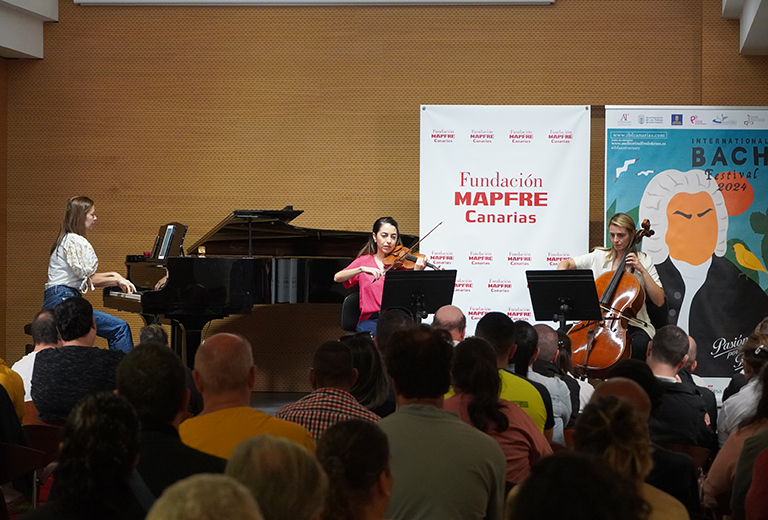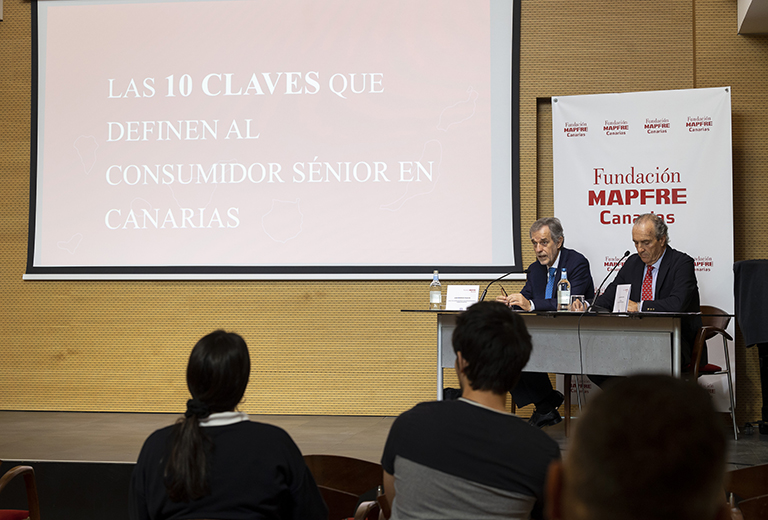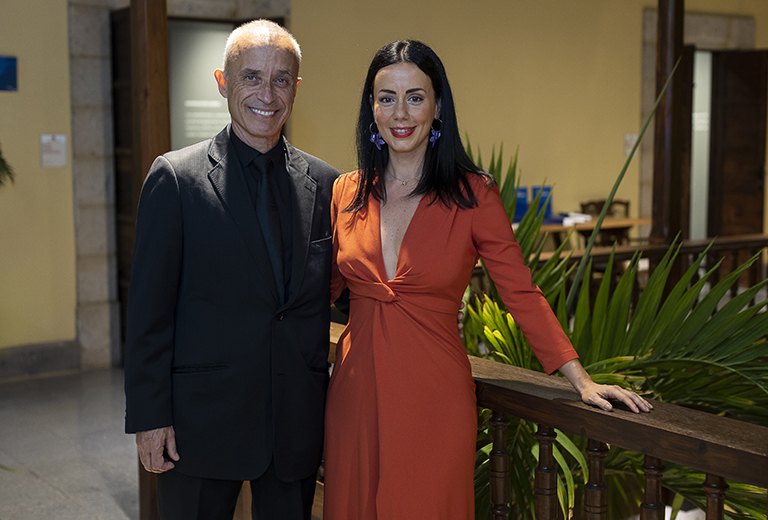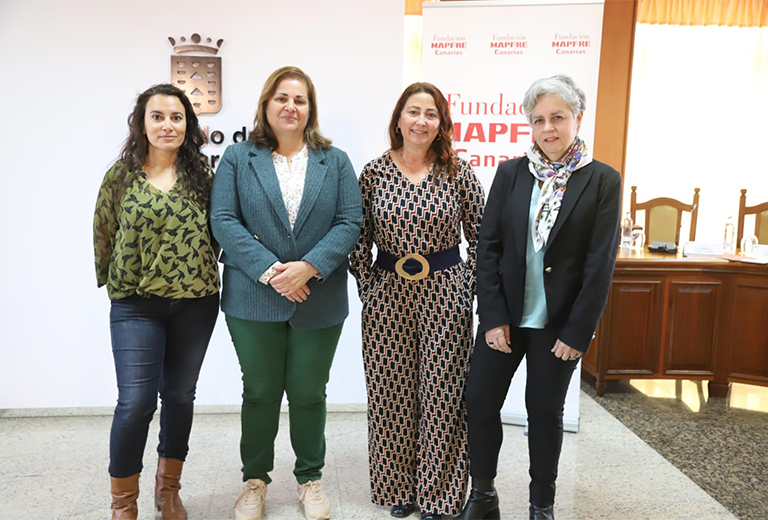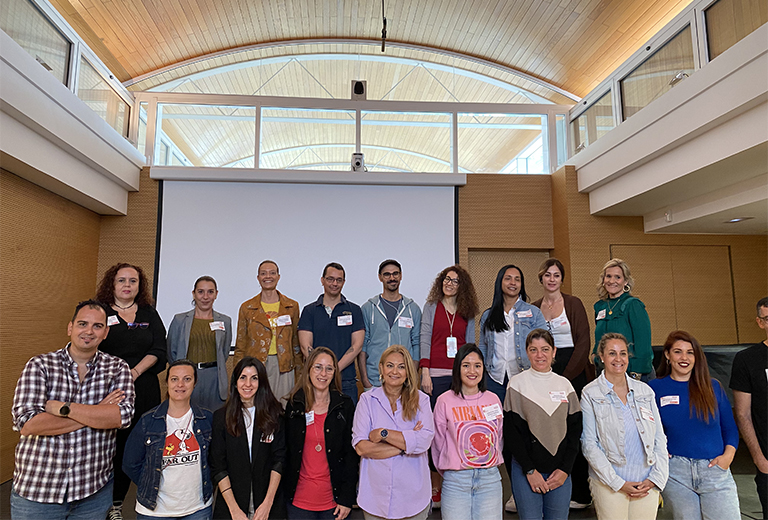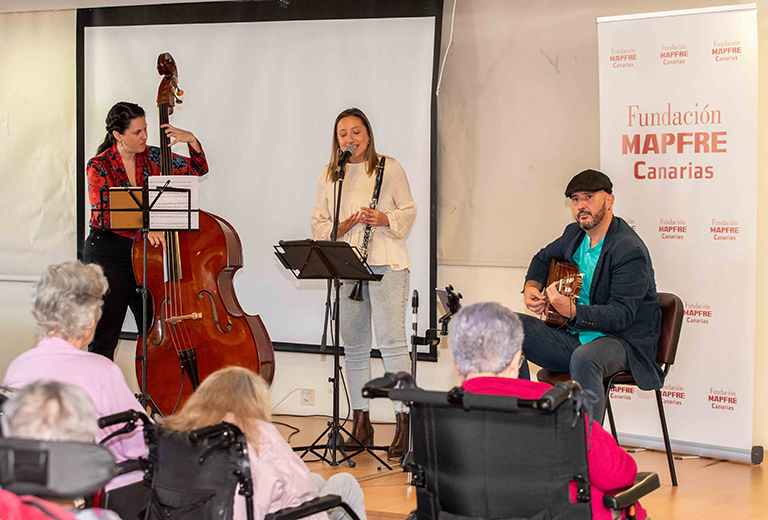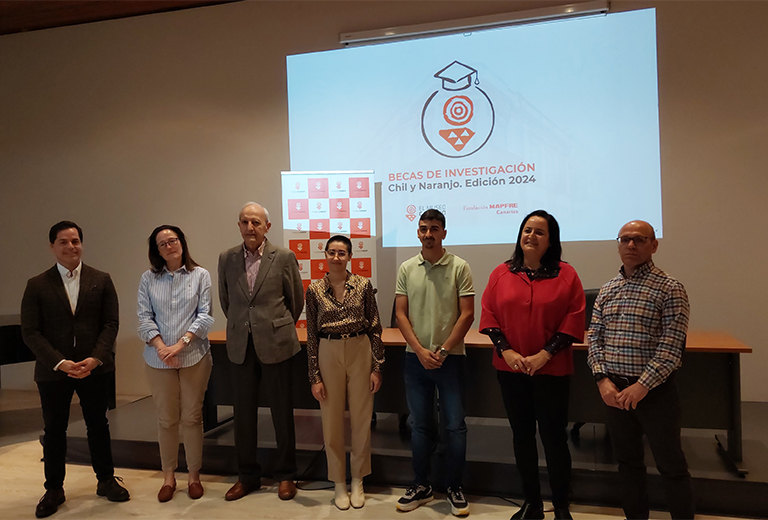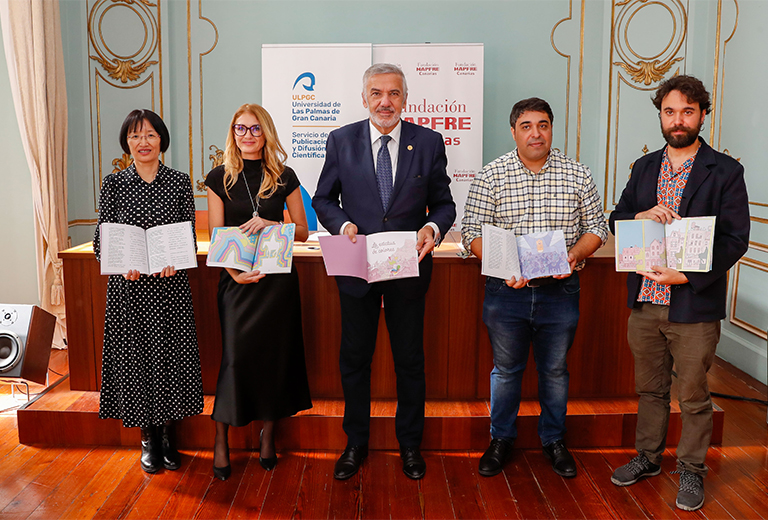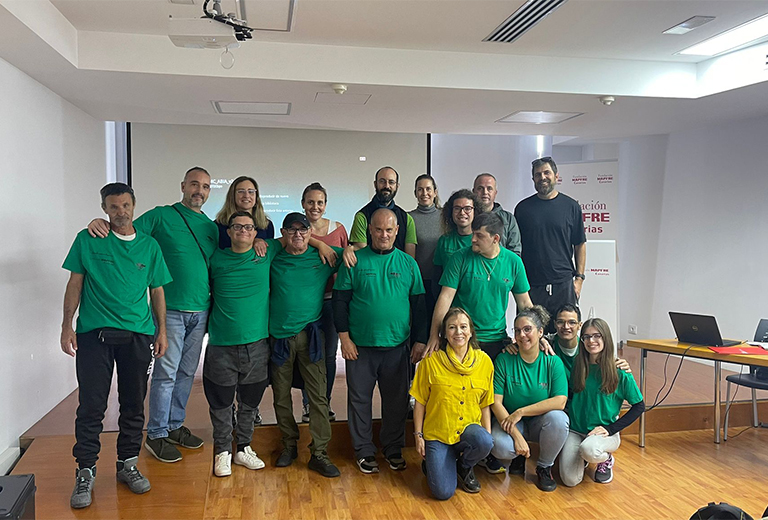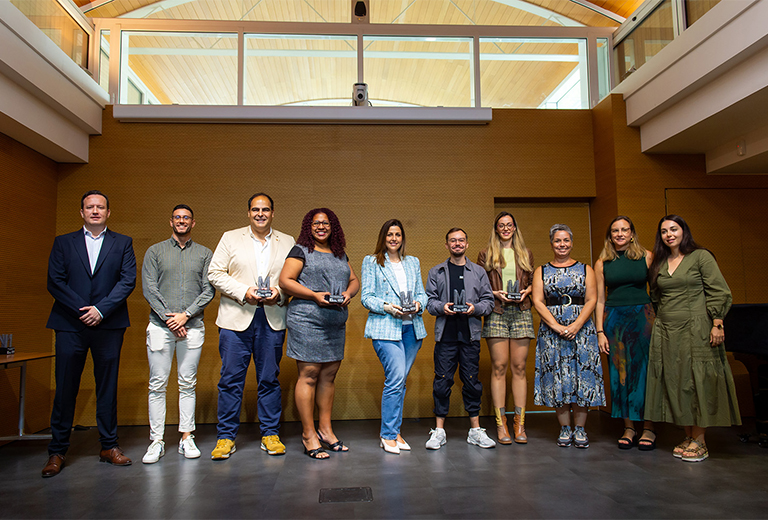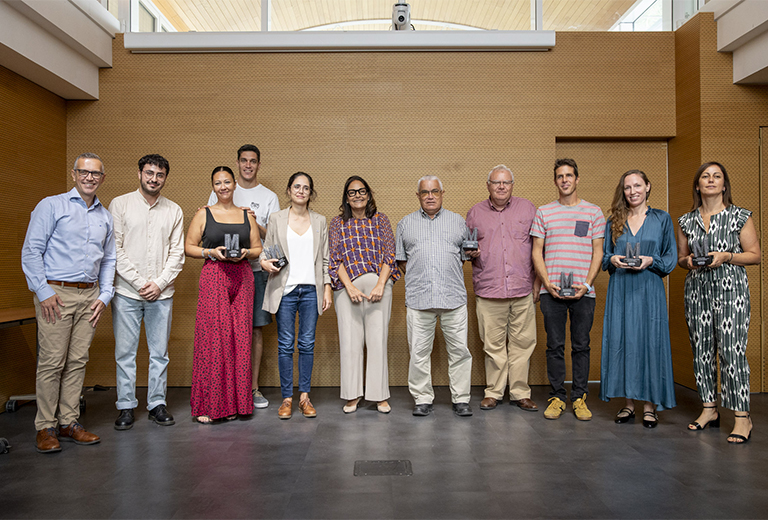Sala de prensa Fundación MAPFRE Canarias
Vive la actualidad de Fundación MAPFRE Canarias
124 notas de prensa
Visualizando:
Todas
IBF Social – Fundación MAPFRE Canarias ‘La música te acompaña’ apuestan por el valor terapéutico de la música en los centros sociosanitarios de Canarias
El concierto IBF Social – Fundación MAPFRE Canarias LA MÚSICA TE ACOMPAÑA, celebrado el 25 de abril en la sede de la Fundación en Vegueta, congregó a cerca de 500 personas de 35 centros sociosanitarios y hospitales de Gran Canaria, Tenerife y Lanzarote para disfrutar de obras clásicas y populares interpretadas por el Trío Gabriel Rodó.
«Donde habita la verdad», un proyecto de fusión musical a través de la guitarra de Juan Miguel Castellano
El guitarrista Juan Miguel Castellano nos ofrece con el proyecto «Donde habita la verdad» un viaje musical desde su visión personal del flamenco, hasta sus raíces canarias, pasando por la fusión con la música clásica, el jazz manouche o gipsy jazz, la música bereber o el rap.
La población canaria mayor de 55 años tiene menos capacidad de ahorro que la media nacional
El Centro de Investigación Ageingnomics de Fundación MAPFRE presentó el pasado 13 de marzo las principales conclusiones que recoge el II Barómetro del Consumidor Sénior en Canarias, un estudio que analiza los hábitos de los 734.113 habitantes de Canarias que superan los 55 años, un colectivo que representa el 33% de la población total de la comunidad autónoma.
«¡Anda jaleo!», un recorrido por la obra de Federico García Lorca a través de la voz de Magdalena Padilla y el piano de Sergio Alonso
La Fundación MAPFRE Canarias acogió el pasado jueves, 14 de marzo, en su sede de La Laguna el concierto «¡Anda jaleo!», un proyecto musical que recorre la obra del poeta Federico García Lorca a través de la voz de Magdalena Padilla y el piano de Sergio Alonso.
Apoyamos la nueva edición de ‘Bullying 1,2,3… acción’, un programa preventivo ante el acoso escolar
El programa, desarrollado por la Asociación Cultural, Social y Artística Actúa 7, está dirigido al alumnado de 6º de Primaria de la isla de Lanzarote, y cuenta con el apoyo del Cabildo de Lanzarote, Fundación MAPFRE Canarias, la Fundación La Caixa, así como con la colaboración de la comunidad educativa insular.
Comienza la sexta edición del Programa «Emplea +35»
La Fundación Universitaria de Las Palmas (FULP) y la Fundación MAPFRE Canarias presentaron el pasado 20 de febrero la sexta edición del Programa «Emplea +35», con 25 personas inscritas, de entre 35 y 50 años, que durante cinco meses adquirirán las competencias para el empleo
como sus niveles de empoderamiento, motivación y autoconfianza.
Laura Manzano inaugura «Identidad ausente» en Fundación MAPFRE Canarias, una exposición sobre el autoconocimiento
La Fundación MAPFRE Canarias muestra a partir del 29 de febrero, a las 19:00 horas, el proyecto expositivo «Identidad ausente», de la artista Laura Sánchez-Manzano Ruiz, una muestra que explora las ausencias personales y el complejo proceso de autoconocimiento a lo largo de la vida.
El violín de Judith Choi y el piano de Javier Negrín llenan de sensibilidad y romance la sede de fundación MAPFRE Canarias
La Fundación MAPFRE Canarias acoge en su sala de conciertos de Tenerife (plaza de San Cristóbal, 20-2ª planta) el proyecto musical «Re mayor o re menor: dos tonalidades opuestas que se unen por la sensibilidad y el romance», un dueto de violín y piano que se podrá disfrutar el 22 de febrero de 2024, a las 19:00 horas, de forma gratuita.
Las poetas tinerfeñas Alba Tavío y Ainara Oleaga protagonizan la Jornada de las Letras Canarias en la Fundación MAPFRE Canarias
Fundación MAPFRE Canarias celebra este año la décimo quinta edición de esta jornada anual con el objetivo de apoyar y visibilizar la obra de los jóvenes creadores de la esfera literaria de las islas y contribuir con la promoción y divulgación de la cultura hecha en Canarias. Las protagonistas de este año serán las poetas tinerfeñas Alba Tavío que presentará su poemario «Te miro como miran los gatos (cerrando los ojos)», y Ainara Oleaga con su poemario «Disección de una rana». Ambos textos han sido publicados por la Fundación MAPFRE Canarias dentro de su colección editorial Canarias en Letras.
Arranca una nueva edición de “La música te acompaña” en el Centro Sociosanitario El Pino
El Internacional Bach Festival y la Fundación MAPFRE Canarias reafirman un un año más su compromiso social a través de la música con una nueva edición llena de novedades de «La música te acompaña». El primer concierto de la temporada 2024 tuvo lugar el pasado 31 de enero en el Centro Sociosanitario El Pino, con la actuación ofrecida por Ana Gil (voz y clarinete), Samantha de León (contrabajo) y Gonzalo Macías (guitarra) ante más de un centenar de personas usuarias y personal del centro.
La sala institucional de la Fundación MAPFRE Canarias acoge la exposición «Ese fulgor», del artista Pedro Torres
Tras su paso por la sede de la Fundación en La Laguna la obra del artista de origen brasileño Pedro Torres se exhibe a partir del 29 de enero en la sala institucional de la Fundación MAPFRE Canarias en Las Palmas de Gran Canaria, donde podrá visitarse hasta el próximo 27 de marzo.
El Museo Canario y la Fundación MAPFRE Canarias entregan las becas de investigación Chil y Naranjo 2024
El presidente de El Museo Canario, Diego López Díaz, y la directora de la Fundación MAPFRE Canarias, Esther Martel Gil hicieron entrega de estas becas el viernes 12 de enero, que en su edición de 2024 han recaído en Jared Jiménez Mederos, en investigación arqueológica y Lucía López Orta, en investigación documental.
La Universidad de Las Palmas de Gran Canaria y la Fundación MAPFRE Canarias presentan el cuento solidario «La estatua de colores», del autor José Alberto Socorro Batista
«La estatua de colores» es el nuevo título de la colección de cuentos infantiles que publican anualmente ambas instituciones con fines benéficos. La colección Cuentos Solidarios suma con este nuevo libro doce títulos, y se consolida como un proyecto editorial que continúa creciendo año tras año, dando lugar a ediciones a bilingües en español-inglés, español-francés, español-chino, que se publican en formato impreso y eBook.
«La Vie en Rose», un dúo a clarinete y piano que recorre importantes obras de los siglos IX y XX
La obra de los compositores Charles-Marie Widor, Robert Schumann, Francis Poulenc y Béla Kovács será interpretada por el clarinete de Andrea Chico, que junto al piano de María Eugenia Jaubert Rius, recorrerán importantes obras del siglo IX y XX en la sala de conciertos de la Fundación MAPFRE Canarias en San Cristóbal de La Laguna el próximo 14 de diciembre, a las 19:00 horas.
El Empleo Verde, una alternativa para la autonomía laboral de personas con discapacidad intelectual y problemas de salud mental
Un grupo de doce participantes recibía el pasado 1 de diciembre en La Laguna sus diplomas de finalización del Taller de capacitación para el Empleo Verde-Intérpretes Ambientales. Una acción formativa se enmarca en las actividades que desarrolla Fundación MAPFRE Canarias dentro del programa Juntos Somos Capaces, para promover el acceso al empleo a personas con discapacidad intelectual y problemas de salud mental y fomentar relaciones entre empresas y entidades sociales desde un enfoque innovador que permita la inclusión laboral de estas personas.
Los «Premios Emprendedores» 2023 galardonan seis proyectos de emprendimiento
Fundación MAPFRE Canarias y la Fundación Universitaria de Las Palmas entregan un año más los «Premios Emprendedores» 2023, unos galardones que potencian e impulsan proyectos de emprendimiento de Canarias. En su quinta edición los premios han recaído en seis proyectos de sectores empresariales como la moda, la educación, el arte, la danza, el medio ambiente y la producción audiovisual.
Fundación MAPRE Canarias impulsa seis iniciativas socioculturales con sus premios «Proyecto Futuro»
La vicepresidenta de la Fundación MAPFRE Canarias, Isabel Suárez Velázquez, entregó en la mañana del 22 de noviembre en la sede Institucional de la Fundación en Las Palmas de Gran Canaria, los premios «Proyecto Futuro» de la edición de 2023. Los galardones forman parte de las numerosas iniciativas que la institución canaria impulsa desde 2021 desde su plataforma colaborativa Experiencia Fundación MAPFRE Canarias, con el objetivo de apoyar propuestas innovadoras en el ámbito social y cultural.
